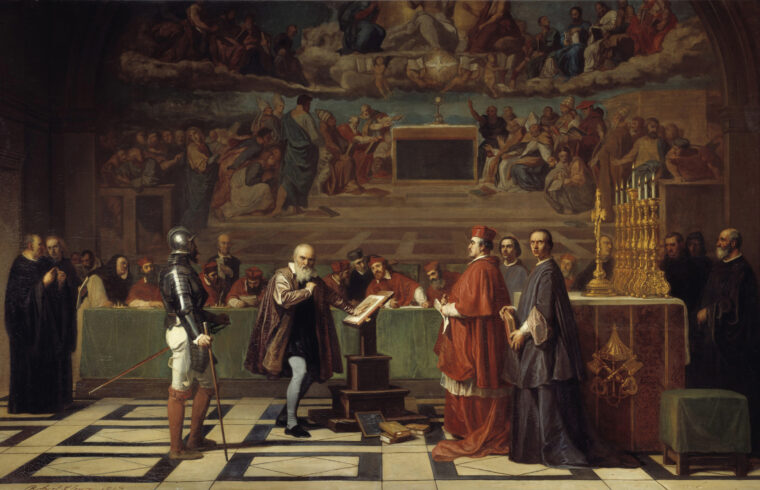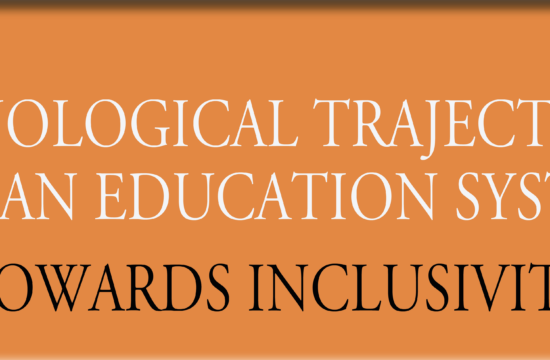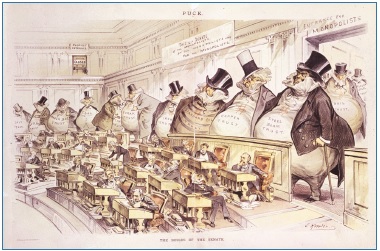Kemal Irmak
General Presıdent of the Education and Science Workers‘ Union, EĞİTİM-SEN – TURKEY
picture: Wikimedia common: A 19th-century depiction of Galileo before the Holy Office, by Joseph-Nicolas Robert-Fleury File:Galileo before the Holy Office – Joseph-Nicolas Robert-Fleury, 1847.png
Prologue
The religiosization of education can be defined as the process of organization and configuration of the educational system in accordance with pre-determined objectives, in which the form, content, methods, lectures and materials used in the teaching-education process are based to a large extent on religious norms and references.
While commercialization and privatization practices are intensifying in education in Turkey, the Ministry of National Education is gradually introducing religious elements into the educational process in almost every field, from the design of the curriculum to practical applications. The steps in the direction of religiosization that have been taken in recent years, in open defiance of the most fundamental principles of educational science, have begun to exert psychological pressure on parents and students.
The Republic of Turkey, since its foundation in 1923, was inspired by the Western world and adopted an educational model based on secular and scientific education. Religious schools were closed, gender separated education was abolished, coeducation was introduced, and a secular scientific approach was adopted in the education system. Interventions to religionize the educational system, in which religious classes are optional and science and culture classes are predominant, have been frequent, but their effects have been limited.
We can start the process of religiosization of education in Turkey with the coup d’état of September 12, 1980. The official ideology of the September 12 coup d’état was the „Turkish-Islamic Synthesis“ and the imposition of compulsory religious classes played an important role in the process of structuring the educational system in this sense and all students were obliged to receive religious classes. Religious communities and groups, whether openly or secretly supported, expanded rapidly, and Quran courses and Imam Hatip schools (religious vocational schools) took important and effective steps towards the religiosization of education in Turkey.
The education system in Turkey has been undergoing a major and drastic transformation, especially since 1980, with the impact of the ‚market and religion- oriented‘ policies adopted in all areas. It is obvious that this process implies that the meaning and function of education and child raising are going to be determined by an educational system that is totally market-oriented in one aspect and dominated by conservative religious ideology in the other.
The „Turkish-Islamist Synthesis“ approach, which was inherited by the political power of the September 12 regime, has been tried to be implemented step by step in the last 22 years, and has surrounded the whole educational system like a spider web with the direct support of the government through schools, residences, courses, etc. of foundations and religious communities placed by the MEB (Ministry of National Education) in the educational system with projects and protocols.
The AKP, which demonstrates at every opportunity that it is the representative of the oppressive and authoritarian mentality of September 12, has shown that it is the most faithful heir of September 12 with the measures it has adopted in the name of the religiosization of education. By means of the practices of religiosization of education, a single nationality (Turkish), a single faith (Islam) following a certain sect (Sunni-Hanafi) and a dominant gender (male) with a conservative religious mentality have been imposed, which has become an important means of discrimination and marginalization against segments of society whose ethnic identity, belief or sect is different.
The practices of shaping education according to religious norms and references, both in terms of content and form, which have been implemented step by step during the AKP government, have become more concrete in recent years. Non-scientific interventions in the educational curriculum, reduction of philosophy-science classes, compulsory religious education for children with autism and mental disabilities, visits of preschool and elementary school students to mosques, de facto implementation of religious education at the preschool level and even in kindergartens, etc. stand out as prominent practices in terms of the religiosization of education in recent years.
CHILDREN AS THE TARGET
GROUP OF THE RELIGIOSIZATION
OF EDUCATION
Since preschool education is not compulsory in Turkey, most parents, especially in villages, are unable to send their children to preschool centers for reasons such as transportation fees, ancillary staff fees, etc. Quran courses, which look like kindergartens, were set up throughout the country by the Directorate of Religious Affairs, the official representative of Sunni Islam in Turkey, started to provide ‚religious education‘ to preschool children between the ages of 4 and 6. It should be noted that while the state pre-school institutions require money from parents as fees, the courses provided by the Directorate of Religious Affairs are completely free of charge. The Quran courses for 4-6 year olds provided by the Directorate of Religious Affairs became the alternative to preschool education by functioning as a de facto religious school. In accordance with a statement from the Directorate of Religious Affairs, some 214 thousand children between the ages of 4 and 6 receive education in Koranic courses under the Directorate of Religious Affairs.
The government, with the 4+4+4 regulation in education (4 years of primary, 4 years of secondary and 4 years of high school), which was implemented 12 years ago, intended to educate the generations in line with its political ideological objectives. But the government not satisfied with this and further expanded his goal and paved the way for religious education activities for the 4-6 age group, which he could more easily ’shape‘ in a conscious and programmed manner. It is inevitable that this situation will have very dangerous consequences for the healthy development of children. Imparting religious education, for whatever reason or justification, to preschool pupils aged 4 to 6, who are still in the age of play and whose concrete and abstract thinking abilities are not yet developed, fundamentally contradicts the principle of the ‚best interests of the child‘ of the UN Convention on the Rights of the Child, to which Turkey is a signatory.
Each age has a certain level of mental maturity, perception, reasoning and abstraction. Thus, in order to transmit information to the child, the child must first be able to understand it, and then he or she must not be crushed under the weight of that information and there must be no possibility that he or she will be harmed by a misunderstanding. As is often the case in the practice of „religious education“ in Turkey, it is inevitable that religious education that creates feelings of fear, anxiety, hopelessness and guilt in children, and that exposes children to religious education at a time when they are not ready to acquire religious knowledge, will have negative effects on children.
The major disadvantage of religious education without a pedagogical basis is that children are constantly taught fear. Fear is the most important reference in religion for orienting toward one behavior or avoiding another. Above all, the fear of sin is taught. Nevertheless, in childhood it is important for children to make mistakes, to develop their own conscience and social judgment, listening to all kinds of voices coming from within before forming their own truths.
As for the religious education of children who are at the beginning of their developmental stage and in the phase of concrete thinking, it is inevitable that children have difficulties in understanding and internalizing the abstract concepts that they try to ‚teach‘ in an education far from pedagogy and based on fear. For instance, when children of this age learn that they will be punished for their mistakes (sins), they believe that they are guilty even when they think about something, and they believe that the bad things that happen are due to their own mistakes. Over time, this feeling of guilt can cause children to become introverted, develop depressive feelings and experience dangerous behavioral disorders, even to the point of wanting to die.
From the configuration of the curriculum within the framework of religious values by the Ministry of National Education (MEB) to concrete practices through religious activities in schools, religious elements are gradually introduced into the educational process in almost all areas. The religiosization measures implemented over the past 22 years, ignoring the most basic principles of educational science and the developmental processes of students, have begun to create intense psychological pressure on students and parents.
WE MUST NOT DEFEND A ‚MARKET AND RELIGION-CENTERED‘ EDUCATION, BUT A SECULAR-SCIENTIFIC EDUCATION.
Around the world, the education system is based on transmitting to children and young people the basic values of societies. The education system and schools are also places where social and cultural values are reproduced. The peculiarity of the school in cultural production is based on the naturalization of existing social differences through the redefinition of their limits. On the other hand, schools also provide environments and opportunities to question and critique these differences. In this sense, schools are also places where advocates of secular-scientific education and opponents of science often come into conflict.
The curriculum includes a total of 33 religious classes, one compulsory subject for 9 years and 3 electives for 8 years. It is not possible to find 33 classes of religion in any of the countries of the world with 12 years of compulsory education. Even the Islamic Republic of Iran does not have as many religious subjects as Turkey. Practices such as Imam Hatip High Secondary Schools, Imam Hatip High Schools and Hafiz Schools are encouraged by the MEB (Ministry of National Education), and there is open favoritism towards these schools.
All educational institutions in Turkey have rapidly moved away from their actual functions due to the racist, sectarian, discriminatory and authoritarian practices of the government. The oppression, violence and imposing practices applied by the government in all areas of social life, especially in education, show that there is an open challenge against secular education, egalitarian, free and democratic life.
The relationship between religion and education in societies is largely determined by the relationship between religion and the State. In other words, the stronger the influence of religious issues on the State, the more directive and imposing they are on the educational system. In this regard, it is impossible to think of the impact of religion on education apart from the existing political structure and the relations established with the ruling classes.
In secular education, the curriculum/teaching programs should be based on scientific knowledge and not on religious norms and references. The teaching programs should explain that there is no single, immutable truth, and that even inanimate matter dissolves and disintegrates, on the one hand, and organizes itself into new forms, on the other. In this way, students will better understand that, unlike the religious discourses often used in education, there can be no ’single, immutable‘ explanation of ever-changing reality.
Since religious teachings are specific to their own times and have local characteristics, their contradictory aspects with universal values have constantly accumulated in the historical progress of humanity. The exclusive definition of the sacred in terms of religion in religious education largely excludes the critical framework of science and the most basic features of social life. Comprehensive and compulsory education, which is the basis of modern society and social development, must respect the equality and fundamental rights of human beings and the best interests of the child, and must be organized in such a way as to enable children and young people to access existing knowledge and acquire critical thinking skills for their self-realization.
One of the important indicators of secular education is ‚coeducation‘. Coeducation is a practice that is not only related to the field of education, but has multifaceted social, sociological and pedagogical characteristics. It is desirable that boys and girls are educated together from childhood, that the different genders get to know each other, respect each other’s differences and raise awareness of gender equality from early childhood. In this way, more balanced personalities are created and respect for others and gender differences can be taught in the educational process.
What lies behind the desire of opponents of coeducation who want boys and girls to be educated first in separate classrooms and then in separate schools is the belief that, by educating children in separate environments according to their sex, they will be ‚kept away from sin‘. A similar approach can be seen in values education. Those who want education to be organized according to religious norms claim that girls and boys should be educated in separate schools or classes on religious grounds, and they understand only ‚religious values‘ when talking about values education. This ignores the fact that schools are not only educational spaces, but also socialization spaces for children in terms of their healthy development.
It is important to question whether students will be formed with a critical mental structure or with an educational structure in which they accept the information given to them by memorizing it textually. Since no society is composed of people who share exactly the same beliefs, the State, which should be at the same distance from all beliefs, should not provide education only for a particular religion or belief.
Secularism is a scientific concept and has rules that apply to everyone. Although the implementation of secularism differs from country to country historically and sociologically, the common feature of all of them is that ‚the State and religion are strictly separated from each other, religion should not interfere with the State and the State should not interfere with religion, and the State should not impose or direct each other‘. The State may not enact laws based on religious norms, nor impose negative restrictions on the religious life of individuals, nor ‚encourage‘ religious life. A secular State cannot interfere in matters such as ‚what are the norms of religions, how they worship, where and when they worship‘. If it interferes with this, it means that it interferes with the personal sphere of faith.
Secularism is an important concept that contemplates the separation of religious activities from State and economic life, that the State does not rely on religious principles and power, and that it obtains its power directly from the people. In this sense, secularism is not the enemy of religion, on the contrary, it is the insurance for all beliefs to live on equal terms. Therefore, in a secular country, the State must be impartial with all religions, believers and non-believers, and keep the same distance from all citizens.
Secular education, which is an important part of public education and focuses on the human being, advocates that all human beings are equal, respectable, open to learning and development. Secularism means grounding State administration, education, legal norms and social life as a whole on reason and science, not on religious norms.
Epilogue
It is important to view education as a social phenomenon and to analyze the variables that define this phenomenon within a holistic framework. Education as a whole reflects the social reality in which we live. Observing the problem from this perspective, it becomes evident that the radical transformations observed in the educational system in recent years are not only the product of interventions made by the current government at various levels.
Throughout the world, educational systems are institutions that transmit to children and young people the fundamental values of societies. The education system and schools are also places where social and cultural values are reproduced. The peculiarity of the school in cultural production is the naturalization of existing social differences by redefining their limits. On the other hand, schools also provide environments and opportunities to question and critique these differences. In this perspective, Turkey’s education system and schools are also areas of struggle in which those who advocate secular education and life and those who want to shape education and social life according to religious norms and references frequently confront each other.
The transformations of the educational system are neither separate nor independent from the development processes of the economic, social and political system. For this reason, in countries like Turkey the struggle for secularism and secular-scientific education cannot be separated from the struggle for fundamental rights, equality, freedom and democracy, especially children’s rights, carried out in schools and society.
Either the education system and schools surrender completely to the dominant ideology or we fight for the kind of education that children and young people should receive and the type of society in which they should live. The reason for the existence of our union and our struggle in Turkey is the defense of public, democratic, secular, scientific education in the mother tongue as opposed to ‚market and religion-centered‘ education.
* This article is published simultaneously in PoliTeknik International and PoliTeknik Español.











